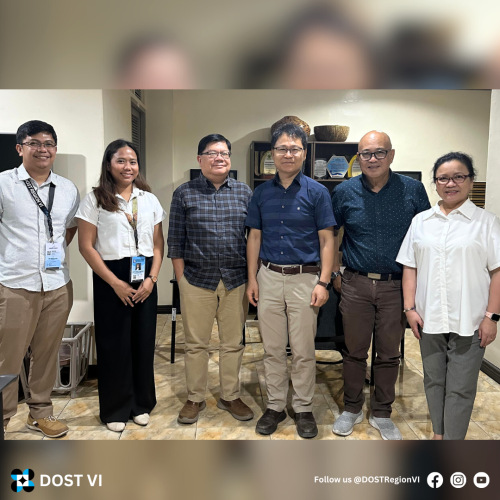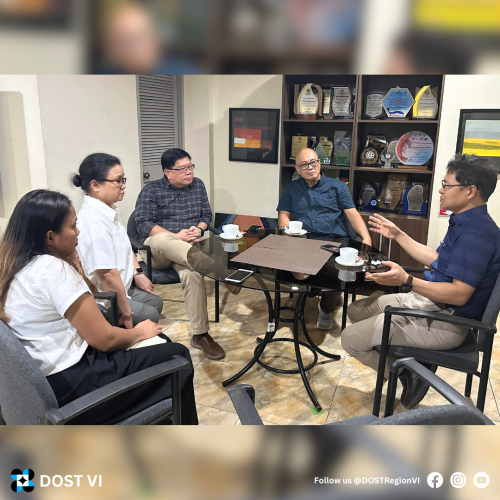
(L-R): Engr. Abraham A. Porcal (DOST VI), Ms. Keithlyn Sarah B. Bernardino (DOST VI), Engr. Rowen R. Gelonga (DOST VI Regional Director), Professor Yung-Cheol Byun (JNU), Dr. Joel de Castro, Head (WVSU BINHI TBI), and Dr. Naomi Cossette R. Luis (DOST VI)
On February 5, 2024, the Department of Science and Technology (DOST) Region VI led by its Regional Director, Engr. Rowen R. Gelonga met with Professor Yung-Cheol Byun of the Jeju National University (JNU) and Dr. Joel de Castro of West Visayas State University (WVSU) to discuss possible project collaborations in the areas of renewable energy, sustainable cities and communities, and artificial intelligence. JNU has been an active partner of WVSU for 15 years, collaborating in various research projects and student exchange programs.
During the meeting, Ms. Keithlyn Sarah B. Bernardino, Supervising SRS and Head of DOST VI’s Research, Development and Innovation Section (RDIMS), shared their ongoing project entitled “Driving Advancement, Generating Access and Transforming Small Island Communities (DAGAT)” to Professor Byun. The project aims to reduce inequalities in small island communities by providing them with access to technological and innovative solutions that can tackle challenges related to water (SDG 6), energy (SDG 7), and disasters (SDG 13). Specifically, DOST VI will be partnering with various local universities to develop water desalination systems to address the lack of potable water in small island communities. They will also design a light and charging system using small-scale wind turbines to provide renewable energy sources to these remote areas, and lastly, they will capacitate the locals in disaster preparedness and response. Professor Byun acknowledged the importance of energy efficiency in island communities, especially in countries like the Philippines. He cited that tourism, among other significant industries of the Philippines, can be improved with sufficient and stable electricity. He shared Jeju Island’s innovative energy framework that locally generates energy, ensuring self-sufficiency without relying on mainland South Korea. Solar and wind farms are strategically located in various areas in Jeju Island and a local startup manages a virtual power plant that optimizes energy distribution using artificial intelligence. This distributed and automated system represents the future of energy. It enables real-time, efficient, and clean power generation and distribution, completely eliminating the need for fossil fuels.

In the area of sustainable cities and communities (SSC), Professor Byun shared their model on Regional Innovation System (RIS) where the academe, government, and industry collaborate in human resource development, technology generation, and ecosystem improvement. RD Gelonga also shared the Innovate Iloilo as a similar model to RIS, highlighting the creation of an innovation roadmap and implementation of several enabling activities that will transform Iloilo City as the Innovation Hub of the Philippines by the year 2030. Additionally, RD Gelonga conveyed the potential for a sister-city agreement between Iloilo City and Jeju Island to facilitate development cooperation between the two cities.
Lastly, the parties also explored possible collaborations in artificial intelligence (AI). Dr. Joel de Castro and RD Gelonga proposed to Professor Byun the idea of coming up with an International AI Conference and Hackathon in Iloilo City, bringing students and experts from South Korea to build the AI community in Iloilo City.
Renewable Energy, Sustainable Cities and Communities, and Artificial Intelligence are three key points that encapsulated the meeting of DOST VI, WVSU, and JNU. The participants concluded their session with a group photo, marking the beginning of a promising collaboration between the three institutions. (KSBBernardino/RDIMS)

